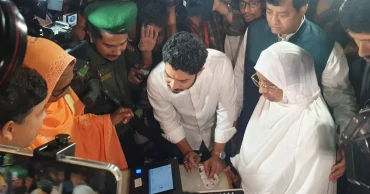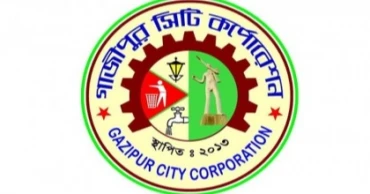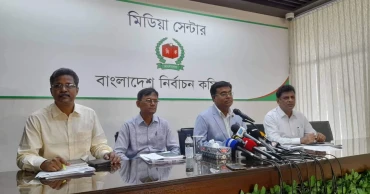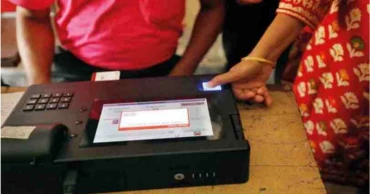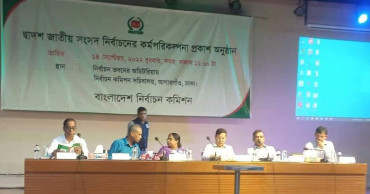EVMs
Peaceful voting underway; Law and order situation good: Zayeda
Early voting has been peaceful and the law and order situation is also good, said Zayeda Khatun, an independent mayoral candidate in the Gazipur City Corporation (GCC) elections.
She made the remark while talking to reporters after casting her vote at Kanaia Government Primary School polling station around 10 am.
There has been no complaint so far against the use of Electronic Voting Machines (EVMs), she said adding “I am hopeful about my victory in the election.’
Also read: Voting underway in Gazipur City Corporation election
She also urged the voters to cast their votes at the respective polling stations.
Meanwhile, Gazipur City Corporation's (GCC) former mayor Jahangir Alam also cast his vote at the same polling station with his mother.
Voting in the Gazipur City Corporation (GCC) election began on Thursday using electronic voting machines (EVMs) in all polling stations in a peaceful manner.
The voting began around 8 am and will continue till 4 pm without any break.
Read more: Voting underway in Gazipur City Corporation election
2 years ago
13,000 law enforcers to be on polls duty: GMP Commissioner
A total of 13,000 law enforcers will be engaged to maintain law and order during the Gazipur City Corporation election slated to be held on Thursday (May 25, 2023), said Commissioner of Gazipur Metropolitan Police (GMP) Molla Nazrul Islam on Wednesday (May 24, 2023).
“ 20-22 members of law enforcement agencies will perform duty at each centre. I hope a free and fair election will be held with the efforts of all amid foolproof security,” he told UNB.
Campaign in the Gazipur City Corporation election has ended and the local administration has taken all-out preparation to hold the polls.Twenty platoons of Border Guard Bangladesh (BGB) members have been deployed alongside 30 teams of Rapid Action Battalion (Rab) and Ansar members, said Returning Officer Faridul Islam.Already the EVM machines and all necessary materials have been sent to the polling centers while CCTVs were installed at all polling centres.
Read more: SCC elections: 387 aspiring candidates inc.11 for mayor submit nomination papersMobile teams will be there in 57 wards while 19 striking forces led by 19 magistrates will remain vigilant at the polling centers.
Already 351 polling centres out of 480 have been declared vulnerable and additional forces will be deployed at these centres, said FDaridul.Gazipur City Corporation election will be held on Thursday, using electronic voting machines (EVMs) at all polling stations.Eight candidates will contest for mayoral posts in the election and there are 248 councillors and 79 female councilor candidates.A total of 11,79,476 voters are expected to exercise their franchise and of them, 5,92,762 are males while 5,86,696 are females and the number of transgender is 18.
Read more: SCC elections: 387 aspiring candidates inc.11 for mayor submit nomination papers
2 years ago
Fate of EVMs in the 12th parliamentary elections hanging in the balance: EC Secretary
The use of the electronic voting machine (EVM) in the upcoming general election is hanging in the balance as it has not received the finance ministry's concession, an official said on Wednesday.
Election Commission secretary Md. Jahangir Alam said this after the 16th commission meeting at the election building on Wednesday.
After the government put on hold a new project proposal of around Tk 9.5 thousand crore, the government is now delaying the release of money for maintenance and repair of old EVMs.
“EVM manufacturing company Bangladesh Machine Tools Factory (BMTF) said that we have 100,000 EVMs, which we will try our best to repair and use in the parliamentary elections subject to receipt of funds from the Finance Ministry. We can finalise the number of seats in which EVMs can be used,” he said.
The Election Commission bought 1.5 lakh EVMs in phases since 2018 at Tk 2.35 lakh each, almost 11 times more than in India.
Now, around five years later, 40,000 of those machines are beyond repair while the rest 1.1 lakh can be fixed but that requires around Tk 1,260 crore, according to a proposal from Bangladesh Machine Tools Factory (BMTF).
Jahangir Alam said that the EC will send a letter to the Ministry of Finance to release the money. If the finance ministry agrees to pay, then in the next step EC can tell you in how many constituencies EVMs will be used.
In response to a question from reporters, the EC secretary said that they are thinking of using as much as possible. “The number of voters is different from place to place. So if smaller areas can be taken, more EVMs will be used and if in a large area, there will be less. So I can say rhat clearly after receiving the final report,” he added.
In response to another question, he said that the commission has always been saying that they will try their best to use EVMs in 70 to 80 seats.
“We have not moved away from that. The number of seats where EVMs will be used will depend on the number of EVM machines available. It depends on how many machines are available, how many of them can be made usable,” he added.
The then KM Nurul Huda Commission bought two lakh EVM machines before the 11th national elections in 2018. At that time they used EVMs in six constituencies in the national elections. The rest are used for local elections including by-elections to various constituencies. Some machines are stored in the BMTF warehouse. A total of one lakh machines became unusable.
Kazi Habibul Awal, after taking charge in February last year, discussed with various stakeholders and took up the plan to use EVMs in 150 seats. About four lakh machines are required for this. The Election Commission made a new proposal of Tk 8,711 crore to the government for the purchase and maintenance of two lakh more machines. But the Planning Commission decided to shelve the project proposal citing the global financial crisis.
2 years ago
EVMs to be used partially again in next JS election: EC
Election Commissioner Anisur Rahman said on Saturday that Electronic Voting Machines (EVMs) will be used partially in the next parliamentary elections.
He made the remark while addressing at smart national NID cards giving ceremony at Bhedarganj upazila Shilpakala Auditorium in the district, as the chief guest.
The commissioner said using the EVMs in all constituencies won’t be possible in the next election due to the budgetary crisis .
Read more: Manipulation of EVMs technically impossible: Commissioner Alamgir
“However, the EVMs will be used partially in some constituencies and the rest will also be covered with ballot papers,” he said, adding that the Election Commission (EC) took preparations to do so.
He said the incumbent EC won’t be criticised like the previous one as the elections organised under them have been held 'in a fair, neutral and peaceful manner'.
“There is no chance directly to contact the government-head during the election time as per the constitution,” the commissioner added.
With Faripur Divisional Election Official Mostafa Faruk in the chair, Deputy Commissioner Parvez Hasan and Superintendent of Police Saiful Hoque among others were present at the event.
Read more: EVMs in 150 constituencies: EC finalises Tk 8,711cr project
3 years ago
Will examine reasons behind slow voting in Rangpur city polls: CEC
Chief Election Commissioner (CEC) Kazi Habibul Awal on Wednesday said that the election commission will examine the reasons behind the slow voting through EVM during the Rangpur City Corporation Election (RCC).
“Some problems have been reported in the Rangpur City Corporation election. We’ve got complaints of slow vote casting through EVMs (electronic voting machines),” the CEC told the reporters after a post-election meeting of Rangpur City Corporation at the Election Commission Bhaban.
“EC does not want to see such problem in future. So discussions are ongoing with all parties,” he said.
Read more: Election violence under present EC drops to zero: CEC
Although there had been less fingerprint problem in RCC election, the vote casting was slow due to various reasons, said the CEC.
3 years ago
Election violence under present EC drops to zero: CEC
Chief Election Commissioner (CEC) Kazi Habibul Awal on Tuesday said election violence under the present Election Commission (EC) has dropped to zero.
“The Election Commission wants to continue it,” he said while talking to reporters at the Election Commission Bhaban.
Regarding Rangpur City Corporation (RCC) election, the CEC said the voting is underway at a slow pace for using electronic voting machines (EVMs). About 56 percent voters have cast their votes till 4 pm, he added.
The voting may continue till 7-8 pm due the long queues at the polling centres, he added.
The voting in the election was scheduled to end at 4:30pm.
Read more: Rangpur City Corporation: Voting begins amid enthusiasm
The EC will look into whether there is any other reason behind the delay in voting , he added.
“We have got some allegations of slow voting due to electronic voting machines (EVMs) but all the voters at the centers will be allowed to exercise their franchise till night,” he said.
The Election Commission is monitoring the election through CC cameras from a control room.
Election Commissioners Brig. General (retd) Ahsan Habib Khan, Md Alamgir, Anisur Rahman, Squadron leader Shahrier Alam are present at the control room and observing the whole situation as already 1,807 CC cameras have been installed at the polling booths.
Read more: Official electioneering period ends tonight, before Rangpur votes for mayor
Voting in Rangpur City Corporation began on Tuesday morning using electronic voting machines (EVMs) at 229 centres.
Nine candidates are vying for the mayoral post while 183 people are contesting for councillor posts under 33 wards. Sixty-eight candidates are contesting the polls for 11 reserved seats, said Returning Officer Abdul Baten.
The mayoral candidates are: Amiruzzaman from Islami Andolon Bangladesh, Abu Raihan from Bangladesh Congress, Touhidur Rahman Mandal from Khelafat Majlish, Mostafizur Rahman from Jatiya Party, Shafier Rahman from Jatiya Samajtantrik Dal, Hosne Ara Lutfa Dalia from Awami League, Khorshed Alam from Zaker Party, Mehedi Hasan and Latifur Rahman as independent candidates.
Campaigning in the Rangpur City Corporation election ended on Sunday midnight amid much enthusiasm.
A total of 229 presiding officers, 1,349 assistant presiding officers and 2,698 polling officers are performing their duties to maintain order in the voting centres.
The first Rangpur City Corporation election was held on December 21, 2017. The tenure of the current mayor will expire on February 18, 2023.
3 years ago
Rangpur city election on December 27
The election to Rangpur City Corporation will be held on December 27.
The election schedule was finalised at a meeting of the Election Commission (EC) with Chief Election Commissioner Kazi Habibul Awal in the chair at the Election Commission Secretariat on Thursday.
Read more:Govt to support Election Commission in holding fair election: Law Minister
EC Secretary Md Jahangir Alam announced the schedule after the meeting.
He said the Commission has also decided to use electronic voting machines (EVMs) and CCTV cameras in the election.
The balloting will start at 8.30 am and continue till 4.30 pm without any break.
The election to the city corporation was held on December 21, 2017. The first meeting was held on February 19, 2017. The tenure will end after five years of the first meeting.The meeting also held an elaborate discussion on different local government elections and by-elections in vacant posts.
Read more:EC directed to fix new date for Noakhali Zila Parishad election
It also decided to hold elections to five municipalities and a number of union parishads on December 29.
The five municipalities are—Bagha, Rajshahi, Birol, Dinajpur, Boda, Panchagarh, Alfadanga, Faridpur and Banpara, Natore.
3 years ago
Polls underway at 57 Zila Parishads
Elections at 57 Zila Parishads of Bangladesh began on Monday (October 17, 2022) morning by using electronic voting machines (EVMs).
The voting began at 9:00 am and will continue until 2:00 pm without any break under the supervision of the deputy commissioners who are acting as returning officers, according to the Election Commission.
Voting in the Zila Parishads will be held at 925 booths in 462 centres across the country while 60,866 voters will cast their vote.
Read:EC doing its job, not under any pressure: CEC
Elected representatives of other local government bodies such as Union Parishads, municipalities and Upazila Parishads are eligible to vote in the election.
Chief Election Commissioner (CEC) Kazi Habibul Awal said on Sunday that CCTV cameras will be used in every centre in the Zila Parishad elections just like the recently held Gaibandha-5 elections. The EC suspended the election to the Gaibandha-5 parliamentary seat for “widespread malpractices” recorded in the CCTV cameras.
The Election Commission says it will monitor the 57 Zila Parishads polls of Bangladesh through CCTV cameras from a monitoring cell set up in its headquarters in Dhaka.
Read: Gaibandha-5 polls: Not a reckless decision, says CEC
3 years ago
EVMs in 150 constituencies: EC finalises Tk 8,711cr project
The Election Commission (EC) today approved a Tk 8,711 crore project to procure Electronic Voting Machines (EVMs) for 150 constituencies, out of 300, for the 12th parliamentary election.
The project details will soon be sent to the Planning Commission for approval, Election Commissioner Md Alamgir said in a press briefing.
Earlier, the project was approved in a meeting of the commission. Chief Election Commissioner (CEC) Kazi Habibul Awal, who recently tested positive for Covid-19, joined the meeting virtually.
Read: Jatiya Party to shun alliances at next election: GM Quader
EC Alamgir said, “The commission earlier decided to use EVMs in 150 constituencies, in the next general election, but 1.5 lakh machines we currently have can be used in highest 70 to 80 constituencies.”
So, the project was approved to procure and maintain new EVMs, he said.
The Election Commission unveiled roadmap for next the general election at a function held at the auditorium of the Nirbachan Bhaban on Wednesday.
Read: Next national election by Jan 29, 2024; EVMs to be used in 150 constituencies
On August 23, the EC decided to use electronic voting machines instead of traditional ballot papers in maximum 150 constituencies in the next general election – likely to be held late next year.
The decision received strong opposition from BNP and its allies, who didn’t join the talks with the CEC that continued throughout the month of July.
However, the ruling Awami League welcomed the decision as it was their demand to use EVMs in all 300 seats in the next election.
Read AL in favour of using EVMs in national election: Quader
Earlier, the commission had invited 39 political parties registered with it for talks on the use of electronic voting machines; 28 political parties responded to the commission’s invitations while 11 parties, including BNP, rejected it.
3 years ago
Next national election by Jan 29, 2024; EVMs to be used in 150 constituencies
The next general election in Bangladesh will be held by January 29, 2024 with the use of electronic voting machines (EVMs) in 150 constituencies out of 300, according to a roadmap published by the Election Commission.
“Seventeen out of 29 parties who participated in the recent dialogue gave positive opinion on the use of EVMs while 12 rejected use of EVM. The Election Commission thinks that it will not be rational to use EVMs as most of the political parties want. Use of EVMs in 150 constituencies will be rational for balancing the opinions of all parties,” Election Commissioner Md Ahsan Habib, gave the keynote speech as chief guest in the absence of the CEC.
Read:AL hails EC decision to use EVMs in 150 JS seats in next polls
EC also said the election has to be held by January 24, 2024 as per the constitution.
Chief Election Commissioner (CEC) Kazi Habibul Awal could not attend the event due to illness, but four other Election Commissioners along with senior EC officials were present.
The Election Commission (EC) published the roadmap for the upcoming 12th National Assembly elections.
Read: EVMs to be used in maximum 150 constituencies in next national polls: EC
This was revealed at a function held at the auditorium of the Election Commission building on Wednesday.
The action plan mentions the challenges to holding fair elections, what the EC should do to deal with them, review the activities of the parties, increasing the use of election technology etc.
The EC said that no one has been able to provide proof of EVM rigging in all the elections that have taken place so far.
Read BNP turns down EC’s move to use EVMs up to 150 seats
Setting parliamentary constituency boundaries
The roadmap says that a new policy will be made in January 2023 to redefine the boundaries of the parliamentary seats. On the basis of which the Geographical Information System will be discussed with the relevant institutions and experts, and the draft of the constituencies will be published in March 2023. The revised delimitation of 300 constituencies will be gazetted in June after objections to the draft were settled in May.
Voter list
The action plan informs that updates are currently in progress. The updated list will be released on March 2, 2023. With the announcement of the parliamentary election schedule, the voter list of 300 constituencies will be published.
Read Election to 61 district councils (Zila Parishads) on October 17
Polling stations
EC plans to set up 42,000 polling stations. In this case, the work will be undertaken in June 2023. The draft will be published in July, and the objections will be settled on the draft in August. After that, Election Commission will publish the gazette of the polling station 25 days before the polling.
Inspection of parties
The process of reviewing the activities of the registered parties will begin this September. In this case, after reviewing all the information, the Election Commission will decide which party's registration will be maintained in May 2023. The final list of registered parties will be published in June of the same year. Before this, registration of new parties will be announced in May.
Read EVMs to be used in maximum 150 constituencies in next national polls: EC
3 years ago
